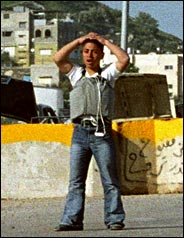
The Israeli government does itself absolutely no favours by accusing my colleague Orla Guerin of anti-semitism for daring to draw attention to the potential public relations advantage for Israel from the arrest last week of a teenage would-be suicide bomber.
The Israeli minister for diaspora affairs, Natan Sharansky, shows astounding dishonesty in claiming that Orla has "a deep-seated bias against Israel" because she noted that a child with learning difficulties had been paraded in front of the world's media. What Mr Sharansky doesn't make clear is that Hassam Abdu was presented to international reporters at the Hawara checkpoint near Nablus some hours after he was apprehended (Source: ABC News).
The day after Hassan Abdu was arrested, the New York Times outlined how events unfolded:
"In the propaganda battle that is always a component of the Middle East conflict, Israel is swift to highlight the Palestinian use of youths barely in their teens. In this case much of the drama was recorded by an Associated Press Television News cameraman, a Palestinian, who was among those waiting to cross the checkpoint....
"...As the rest of the story unfolded, it was captured on tape by the cameraman....
"...Israeli military and government officials immediately invited journalists to the scene and then placed Hussam on display for several minutes."
There are two points:
1) The BBC wasn't the only media outlet to draw attention to the way Hussam Abdu's capture was presented to the international media -- so why is the Corporation being singled out for criticism?
2) It is utterly ridiculous to claim that noting the fact that a child with learning difficulties was deliberately presented to journalists -- who were invited by press officers to the checkpoint -- shows anti-semitism and a "deep seated bias against Israel." Mr Sharansky's crying wolf routine seriously undermines the campaign against genuine anti-semitism, which is on the rise across Europe.
More troubling by far, though, is the call by some Israeli newspapers for the explusion of foreign reporters who didn't cover the story.
Criticising the foreign media is one thing -- but trying to interefere in their editorial decisions is another.
Meanwhile, there's much discussion in newsrooms over yesterday's "Mogadishu Moment" -- the graphic TV footage showing the mutilation of the bodies of four American contractors in Falluja.
My feeling is that in the right context, at a suitable time of day and preceded with a proper health warning, showing the pictures is justified (provided the next of kin of those killed have been informed.)
The danger, though, is that if the 24 hour news channels take graphic footage and repeat it time and time again as part of their non-stop coverage the pictures quickly lose their power to shock and become little more than wallpaper.
Discuss

0 Comments:
Post a Comment
<< Home